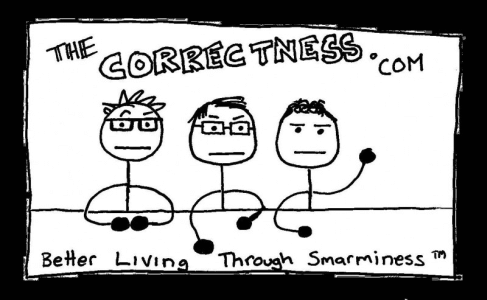The Collapse of Social Science: A Correctness Argument Starter
Dear readers:
This rant is a break from the haha, and a chance for an interesting discussion. If you are in the mood for some funnies, why not check out this jem from our back catalogue:
http://www.thecorrectness.com/writing/travel-guide-to-middle-earth/
And now, a serious rant:
Some of you folks know I am back to school, and I have been reintroduced to my old arch-nemesis, social science. Oh, just to clarify, not any one specific social science is my arch nemesis. It’s actually ALL of the social sciences. Group elements of psychology, sociology, social anthropology, communications theory, and to some extent economics. I won’t even attempt to classify philosophy in here.
Without spending pages and pages comparing the implementation of the scientific method in pure sciences and the “social” sciences, I will skip right to my main concerns.
1. The social sciences are largely failed sciences, because they are based on generalities which are subject to the whim of popular culture, the enculturation of the subjects and the researchers, and more importantly, presumptions about whole groups of people.
2. Social scientific “fact” has a shorter half life than pure science, and the demonstrable exceptions to the theories are manifold, and more dependent on statistical analysis of variation to be provable.
Any science that dwells in generalities, to me at least, is open to bias. However, if bell-curve racism is on your greatest-hits list, then you are going to love recent gender research.
Social scientific research into all kinds of matters has been tailored to the mood of the times for years. It was factually provable that women were too intellectually delicate to vote some time ago. Don’t even get me started on the ridiculous stereotype minefield that is the communications concept of “genderlect”.
Of course, my Humanist and egalitarian bias is a convenient position for convincing college girls that I am all sensitive and shit. But I assure you, the real problem here is not that I think there are no discernible, testable variations along gender lines. My concern is that the very things we seek to reveal as guideposts for a true understanding of the differences between humans are, for the most part, socially constructed. What we can prove with hard science is not a consistent determinant of behaviour. I would like to reiterate that point: Factual tangible science does not alone provide us with accurate tools categorizing the complexity of human behaviours by race, gender, age, or hamster preference.
Gender research in children has been struggling along gamely as well. While the pure sciences can demonstrate differences in neurobiology, these developmental differences are not supported into adulthood. Adult males and females, by around age 30, have all caught up with each other.
The concern for some time has been that there are (supposedly) testable differences in certain mathematical and spatial abilities in boys that girls struggle with. In the early nineties, the problematic idea that boys were somehow getting ahead was blamed on patriarchal enculturation. Programs were developed to foster girls’ self esteem in math and sciences. Later, in the early 2000’s, physical neurobiological differences were the source of these problems, and this was simply a matter of differences in brain development- perhaps if math were more based in context, and less in abstractions, the immature female brain might be better suited to deal with such matters? After all, young women had such advantages in social matters, languages, and organizational ability over young men.
Here’s the problem though. Some current research suggests that there are no statistical differences between mathematical ability in boys and girls. AT ALL. No difference. So what have we been proving is “fact” and arguably “true” for 25 years? Well, essentially nothing. The hard science about differences in brain development adds up, on the human level, to precisely dick all- Of course, that is a social scientific result, so it could just as easily be disproven…
Here is the fundamental problem with the Great Social Sciences. Generalizations are valueless, ineffective and extremely dependent on the worldview of the researchers involved.
For some time, I have had a theory I have been wanting to put to the test. Suppose we divide a group of children into “red hats” and “blue hats”. Then, we spend years tracking them. We tell the community at large that there are correlations between behaviour types and academic abilities of red hats and blue hats. Then, we allow researchers to study the test results, the blood types, the musical skill, the stool samples of both groups. I argue that we would quickly notice trends in the arbitrary red-hat-blue-hat divisions, trends with which we could predict behaviour, trends which were statistically demonstrable.
I must assure you that these variations would be statistically demonstrable. If there were any black and white truths to the behaviours and abilities of red hats and blue hats, there would be no need for statistical analysis. Any old chart would show that all blue hats are unable to write poetry. It is for that reason that statistics are so insidious. They show us differences (they expose deviants?) too small to be consistent, too small to be casually observable, and yet they are treated with with the same weight and importance of obviously quantifiable data.
Where social sciences fail are in the complexity and elegance of humanity. That which we seek to define runs in waters precisely as deep as that which we already believe. Even in the case where we choose to believe the opposite of the popular conception, we are simply creating arguments to support an equally intangible alternative.
Of course, you may all choose to disagree with me, because I am a red hat.
RM
